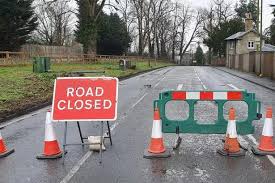Managing Scheduled Road Closures for Smooth Traffic Flow in the UK

Scheduled Road Closures: Ensuring Smooth Traffic Flow
Scheduled road closures are a common occurrence in urban areas and on highways, often necessary for maintenance, construction, events, or other infrastructure projects. While road closures may cause temporary inconvenience to motorists and pedestrians, they play a crucial role in ensuring the safety of road users and the efficiency of transportation networks.
Reasons for Scheduled Road Closures
There are several reasons why scheduled road closures are implemented:
- Maintenance: Road closures are often required for routine maintenance activities such as resurfacing, pothole repair, line marking, and signage upgrades.
- Construction: Major construction projects like building new roads, bridges, or tunnels may necessitate temporary road closures to ensure the safety of workers and the public.
- Events: Special events such as parades, marathons, festivals, or street fairs may require road closures to accommodate participants and spectators.
- Emergency situations: In cases of emergencies like accidents, natural disasters, or hazardous material spills, road closures may be implemented to protect public safety.
Impact on Traffic Flow
Scheduled road closures can have a significant impact on traffic flow and travel times. To minimise disruptions and congestion during closures, traffic management plans are put in place. These plans include alternative routes, advance notice through signage or media announcements, and coordination with local authorities to ensure smooth diversion of traffic.
Tips for Navigating Scheduled Road Closures
To navigate scheduled road closures effectively:
- Plan ahead: Check for scheduled road closures in advance and plan your route accordingly. Use GPS navigation apps that provide real-time traffic updates.
- Follow detour signs: Pay attention to detour signs and follow alternative routes suggested by authorities to avoid delays.
- Be patient: Understand that road closures are temporary measures aimed at improving infrastructure. Exercise patience and cooperate with traffic management personnel.
In conclusion, scheduled road closures are essential for maintaining safe and efficient transportation systems. By understanding the reasons behind these closures and following guidelines for navigating them effectively, we can all contribute to smoother traffic flow and safer roads for everyone.
Understanding Scheduled Road Closures: Key Questions Answered
- 1. Why are road closures necessary?
- 2. How are road closure schedules determined?
- 3. Are there alternative routes during road closures?
- 4. How can I stay informed about upcoming road closures?
- 5. What should I do if I encounter a unexpected road closure?
1. Why are road closures necessary?
Road closures are necessary for a variety of reasons, including maintenance, construction, events, and emergency situations. Maintenance activities such as road resurfacing, pothole repair, and line marking require temporary closures to ensure the safety of workers and the public. Major construction projects like building new infrastructure also necessitate road closures to facilitate construction work and protect road users. Events such as parades or festivals may require closures to create a safe environment for participants and spectators. In emergency situations like accidents or hazardous material spills, road closures are crucial to safeguard public safety and allow emergency responders to address the situation effectively. Overall, road closures play a vital role in maintaining infrastructure, ensuring safety, and managing traffic flow efficiently.
2. How are road closure schedules determined?
Road closure schedules are determined through a careful planning process that takes into account various factors such as the nature of the project or event requiring the closure, anticipated traffic volume, impact on local residents and businesses, and coordination with relevant authorities. In most cases, road closure schedules are established based on a thorough assessment of logistical considerations to minimise disruptions to traffic flow while ensuring the safety of road users and workers. Communication between project organisers, transportation agencies, and local communities is crucial in finalising road closure schedules to achieve efficient implementation and mitigate inconvenience to the public.
3. Are there alternative routes during road closures?
During scheduled road closures, alternative routes are typically designated to help redirect traffic and minimise disruptions. Local authorities and transportation agencies work to identify and establish alternative routes that drivers can use to navigate around the closed section of road. These alternative routes are often signposted in advance to provide clear guidance to motorists, ensuring a smoother flow of traffic during the closure period. It is advisable for drivers to familiarise themselves with these alternative routes and follow the designated detour signs to reach their destinations efficiently while the road closure is in effect.
4. How can I stay informed about upcoming road closures?
To stay informed about upcoming road closures, it is recommended to regularly check local government websites, transportation department announcements, and social media channels for updates on scheduled road closures in your area. Additionally, signing up for email alerts or notifications from relevant authorities can provide timely information about planned road closures, detours, and alternative routes. Utilising navigation apps that offer real-time traffic updates and road closure notifications can also help you plan your journeys effectively and avoid unexpected delays due to road closures. By staying proactive and informed through multiple channels, you can better navigate around scheduled road closures and minimise disruptions to your travel plans.
5. What should I do if I encounter a unexpected road closure?
When encountering an unexpected road closure, it is important to remain calm and follow the guidance provided by road signs and traffic management personnel. Avoid abrupt manoeuvres that could endanger yourself or other road users. If possible, safely pull over to the side of the road and reassess your route using a GPS navigation app or seeking alternative directions from local residents or authorities. Patience and cooperation are key in such situations to ensure a safe and efficient resolution to the unexpected road closure.
